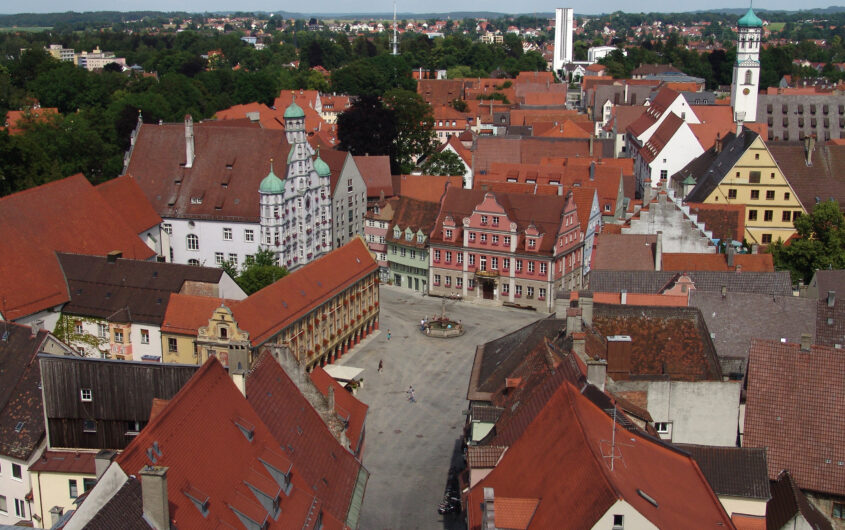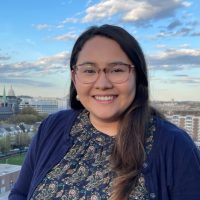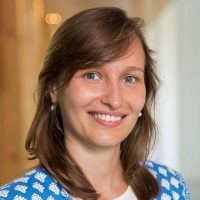
Dr. Volkmar Rudolf via Wikimedia Commons
Shifting Structures for Social Cohesion

Itzel Hernandez
U.S. House of Representatives
Itzel Hernandez has dedicated her career to public service through roles in community organizing, education, and government. She currently serves as a staff member in the U.S. House of Representatives. As a board member of the Congressional Hispanic Staff Association, she seeks to build a workforce that reflects the diversity of the American people. Itzel is a proud daughter of Mexican immigrants and is a first-generation graduate of the University of Utah. She is an alumna of the Congressional Hispanic Caucus Institute and Trabajadoras Fellowships.

Sonya Ouertani
German Foundation for International Legal Cooperation
Sonya Zayneb Ouertani studied international politics and public administration in Germany, France, and Canada. She has various working experiences in the field of international cooperation with German governmental and EU institutions in Thailand, Burundi, Jordan, North Macedonia, and Pakistan. She currently works in the field of international rule of law promotion, access to justice and human rights. Additionally, Sonya is socially engaged in different fields, mainly in Jewish-Muslim dialogue formats and in strengthening a diverse Muslim community in Germany based on an anti-patriarchal and gender-inclusive approach. She analyzes current political developments in critical, decolonizing, and intersectional ways and creates spaces for active solidarity among marginalized groups.
How Local Organizations Create Inclusive Communities
The AGI project on “Social Divisions and Questions of Identity in Germany and the United States” brought together a diverse group of participants to address common challenges outside of metropolitan areas, including questions of identity and the polarization of societies. During the exchange within the cohort and with guest speakers from Memmingen (and Glendale, AZ, in 2022), the opportunities and challenges of social cohesion as an inclusive process were reflected upon.
In our understanding, inclusive social cohesion is based on how a community treats its most vulnerable and marginalized members. Social cohesion as an inclusive process requires a focus on the needs and rights of the most marginalized members (even critically reflecting on the idea of who belongs to this community, who is seen as a valuable member or an outsider). In addition, it demands a reflection of privileges, hierarchies, and power dynamics within a system or community, especially by members in power and privileges. During group discussions, it became clear that social cohesion is closely related to power dynamics and asymmetries that continuously structure our societies and interactions in subliminal and conspicuous ways. For instance, who are those with power and decision-making authority to impact our communities? Whose opinions and needs are heard in societal processes? Who can define whether a community is divided or cohesive? To uncover and deconceptualize these phenomena seem particularly interesting and needed, however challenging at the same time as it questions the status quo and requires a power shift.
To further illustrate our experiences, we would like to draw attention to a few organizations and individuals that we met and who undertake efforts to make the city attractive to its diverse communities and increase inclusive social cohesion.
The role of women within a community is crucial regarding the social dynamics and questions of power since gender-based discrimination and sexism continue to structure our communities and societies in Germany and the United States. Our group met women who are part of the Frauennetzwerk Memmingen (Women’s Network), an established network composed of women’s groups with numerous associations. Despite varying organizational missions and causes, as a collective, the Frauennetzwerk Memmingen aims to facilitate women’s equality and political interests through joint actions, public statements, and events such as International Women’s Day. Their work lends perspective to city officials and stakeholders for the needs of women in their town such as gender equality, domestic abuse resources, and reproductive healthcare. Although the Frauennetzwerk Memmingen creates a space for social cohesion in its efforts to unite women, disagreement on feminism and gender roles through city traditions such as Fischertag (Fishermen’s Day) which dates to medieval times (women participants were excluded until 2022) are still prevalent. You may find further reflections on this topic here.
An inclusive process of social cohesion is an ongoing exercise.
Another group in society that is often left in the margins are refugees and immigrants. In particular, immigrants of color continue to face racism, exclusion, and marginalization across Germany and the United States. Different governmental actors like the Koordinierungsstelle Integration Memmingen (Coordination Office for Integration) foster social inclusion by creating pathways for political and social participation, reducing discrimination, and respecting individual rights. During our meeting with the head of the Coordination Office for Integration, it became clear that the understanding of what integration means is still highly debated and unclear in Germany. The question of whether assimilation or integration was the main goal, or which was preferred to create inclusive social cohesion, was being considered by city officials. Overall, these societal processes challenge power structures and existing hierarchies.
Stolpersteine (stumbling stones) are commemorative bronze plaques with the names of victims of the Nazi regime that can be found in more than 1,100 locations in seventeen European countries. Each plaque is located at that person’s last known address. As we walked the cobbled streets of Memmingen, we could spot them embedded amongst the gray cobblestones. We were able to learn more about the plaques during an intergenerational meeting composed of middle school students, educators, and facilitators overseeing the program locally in Memmingen and members of the community who as a group each played a role in the research, installation, and maintenance of the Stolpersteine across their town. A particularly impactful moment in this meeting was when an older gentleman reflected on how the Stolpersteine project served not only to demonstrate remembrance for victims of the Holocaust but an opportunity for him to rectify the wrongs of his ancestors. You may find further reflections on this topic here.
The city of Memmingen is in a prosperous region of Southern Germany where access to housing is limited. Historically, the city has not expanded in geography or kept up with the needs and increased interest in housing options. Earning power, fluctuation of labor needs, and generational shifts have created barriers for certain individuals to obtain housing. Throughout discussions with city officials, building a new hospital and an institution of higher learning were proposed as possible solutions to address housing and retain community members. Despite a need for increased housing, unhoused individuals were not as prevalent compared to our time in Glendale, AZ, where the unhoused population has grown 139 percent since 2020. You may find further reflections on this topic here.
The issue areas covered are only a fragment of the topics, individuals, and organizations we were able to learn from while in Memmingen. Our meetings and thought-provoking conversations demonstrate that an inclusive process of social cohesion is a required ongoing exercise. When a community begins to disregard the vulnerable, their rights and needs, instability and social division will only grow. In addition, an intersectional approach is necessary to capture the complexities of identities and increase solidarity among different groups within a community. As societies grow, integrating a multifaceted approach to addressing division in society can be mitigated through promoting social participation and promoting values of equality of rights, equity, and dignity.








